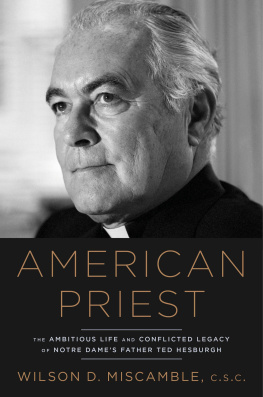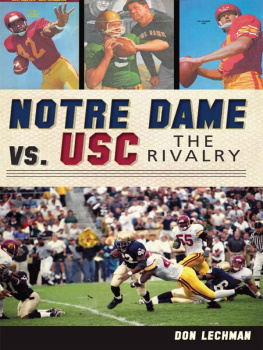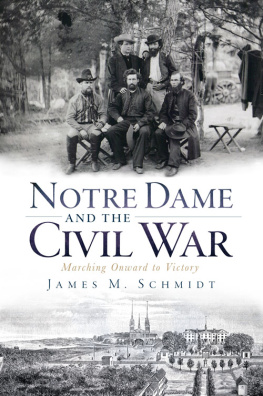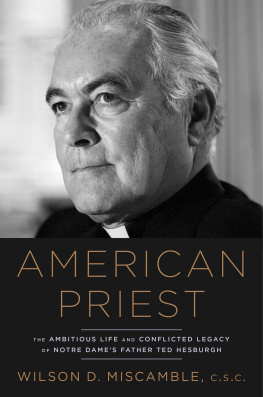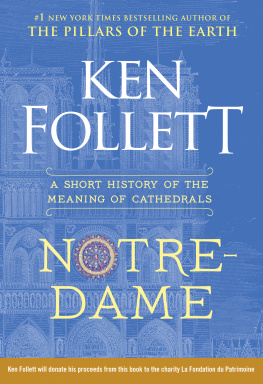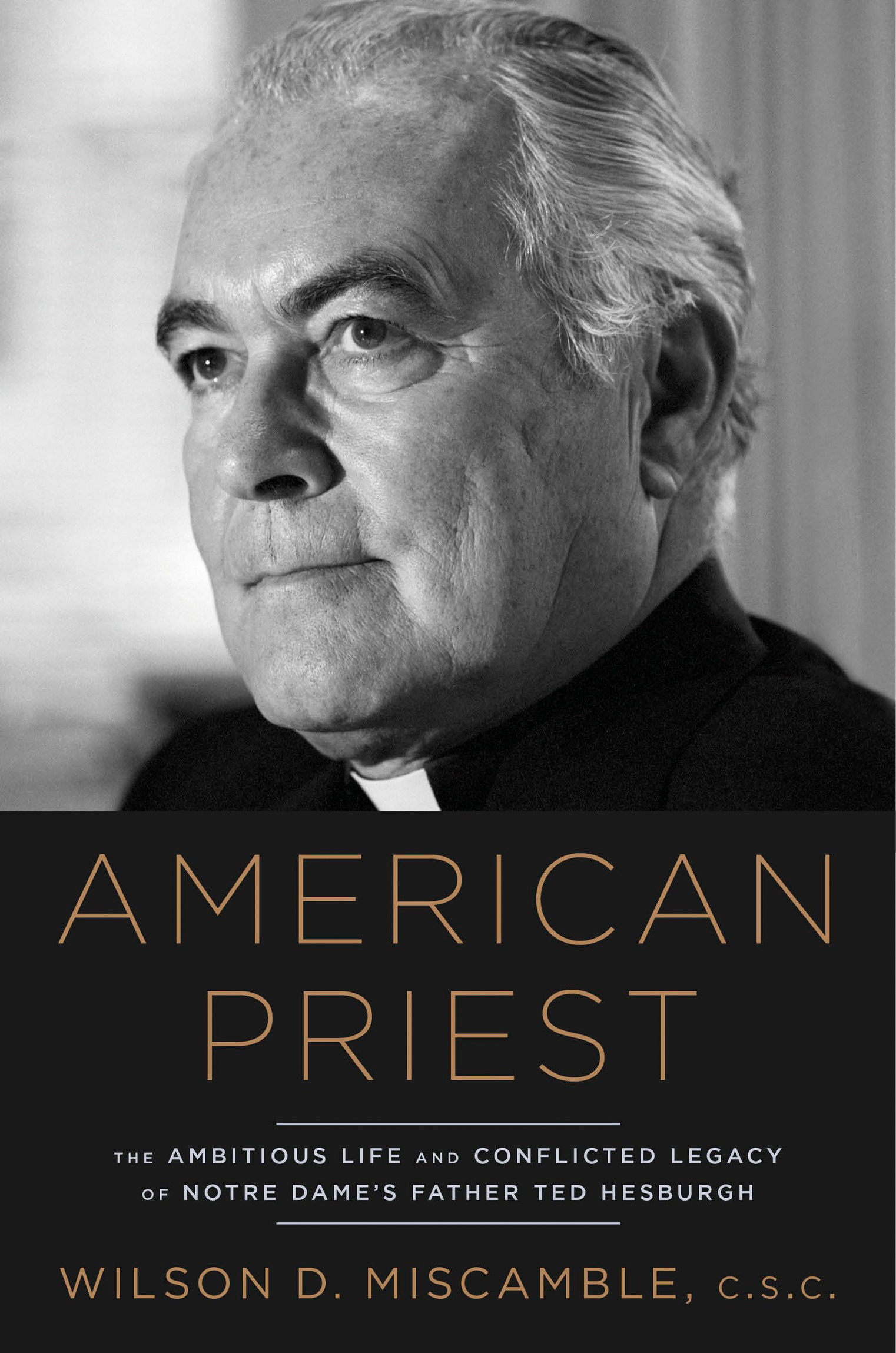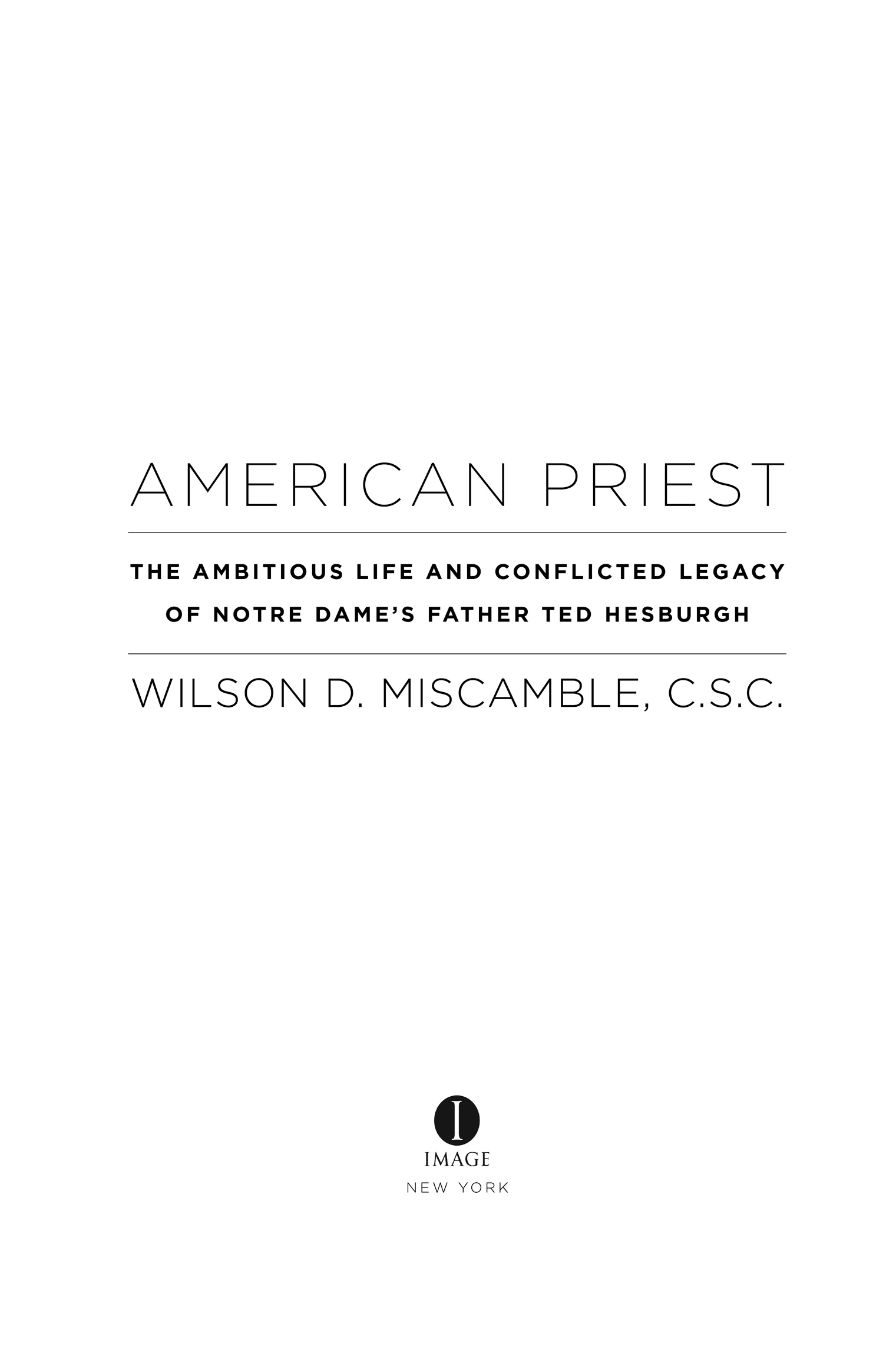Copyright 2019 by Wilson D. Miscamble
All rights reserved.
Published in the United States by Image, an imprint of the Crown Publishing Group, a division of Penguin Random House LLC, New York.
IMAGE is a registered trademark and the I colophon is a trademark of Penguin Random House LLC.
Photography credits appear on .
Library of Congress Cataloging-in-Publication Data is available upon request.
PREFACE
The Evolution of a Bookand a Relationship
Father Theodore Martin Hesburghalways Father Ted to medied peacefully at Notre Dame late in the evening of February 26, 2015. He lived a long and full life. American Priest sheds light on this life and his many and varied engagements both at the university that he led for thirty-five years and far beyond it. The book has had a long gestation, and its form and content have evolved over the two decades since I first announced to Father Ted that I planned to write about him.
One fall evening in 1994, I called Father Hesburgh and caught him at his desk in his office suite on the thirteenth floor of the Hesburgh Library. I asked if I might see him and he invited me to come right over. Five minutes later I was in his office surrounded by all the special photographs, memorabilia items, and autographed books that gave glimpses of his associations, activities, and accomplishments over his long tenure as president of Notre Dame. From its window we could see Our Lady positioned so gracefully atop the universitys signature Golden Dome. Father Ted was smoking a sizable cigar and had been reading the New York Times with a magnifying glass and listening to classical music. Father Ted drew my attention to some of the first editions he had on his bookshelves. I then caught him a bit unawares when I interrupted him and said, as best I can recall: Well, Father Ted, I have come to see you tonight about writing a book. I want to write a book about you. After paying a tribute to his best-selling autobiography, God, Country, Notre Dame, I explained that I planned to write a comprehensive biography of the life and times sort that would build on his memoir.
Father Ted was taken aback by this statement of my intentions. We sat down, and I must say that he momentarily was caught out for the appropriate words, definitely a rare occurrence for him. He knew I was a historian of some ability, but I was a student of postwar American foreign relations. I had no special background as a biographer, unlike my distinguished colleague Fr. Marvin R. OConnell, whose terrific biography of Archbishop John Ireland Father Hesburgh so admired. Furthermore, he knew that I was heavily engaged in my work as chair of the history department at Notre Dame and would not be able to devote my full energies to this effort. Perhaps with such concerns in mind he puffed on his cigar, and after exhaling he offered a warning. He revealed an insightful sense of his extensive activities, and explained that it would be hard for a single historian to capture in a full and meaningful way the extent of his actions over the years since he had emerged as a prominent public figure in the United States. He even recited for me the extent of the holdings in his presidential papers housed in the University of Notre Dame Archives. Additionally, he asked, how could any single person, let alone a busy one like me, investigate with care the records of the various commissions and agencies on which he had served.
Having come to know Father Ted over the years since my ordination as a Holy Cross priest and appointment to the regular faculty of Notre Dame in 1988, I had expected something like this response. I had two rejoinders at the ready. First, I explained that a trained historian did not need to read every document ever associated with a subject to get the gist of things. Otherwise, I continued, how would biographies be written of great figures like Winston Churchill and Franklin Roosevelt, historical figures with whom he knew I was well familiar. Putting that matter to the side, I readily conceded to him that it would be a major undertaking to write a definitive biography of him. I went further and told him candidly that I planned to write another booka study of the transition from FDR to Harry Truman and its implications for American foreign policybefore I settled down to devote myself to his biography. After that work was completed, I assured him, I would give myself fully to what I knew would be a multi-year project. Then I introduced a delicate matter and explained that I had to announce my intention now so that I might ask his cooperation and help while he still enjoyed vigorous good health. I advised that I would need to speak with him extensively while his memory was still sharp and incisive. I did not seek to be his authorized biographer in any way, but I recall guaranteeing him that I would tell his important story well.
Reassured by my response Father Ted thereupon promised me his cooperation and suggested that we might have a drink to mark our agreement. We walked down the little corridor off his office to the kitchen area of his suite and he produced a bottle of Cutty Sark, the blended scotch whiskey that he preferred when the Manhattans mixed for him at the Morris Inn were not available. Some tumblers soon had ice in them and healthy portions of the smooth drink. We returned to his office and talked for over two hours, refilling our glasses once or twice. I produced for Father Ted from a folder I had brought with me a title page for the biography, a title that I subsequently varied slightly. It had on it: AMERICAS PRIEST: FATHER HESBURGH OF NOTRE DAME. He signed it and dated it in his clear handwriting: Fr. Ted Hesburgh, csc10.17.94.
WHY I DESIRED TO write a biography of Father Hesburgh and why I believed myself capable of doing so deserves some explanation. I first had come to know of Father Ted in a limited way when I arrived at Notre Dame from Australia as a doctoral student in 1976. I observed him at a distance, but I met him only once and that in the context of a gathering of graduate students. I focused on my own history studies and appreciated his leadership of Notre Dame from afar. I returned to Notre Dame a second time in August of 1982 to enter the Holy Cross order, and I met him occasionally during my seminary years. He kindly displayed some interest in me, knowing that I possessed a doctorate and hoped to serve in the higher education ministry of the Congregation of Holy Cross. He assured me of his satisfaction when I joined the full-time faculty of the history department after my ordination in 1988.
I began my service on the regular faculty of Notre Dame just after Father Hesburgh ended his decades as president and moved on to his new status as president emeritus, which he held for a further quarter century. As he made his adjustment to this new role, and initially traveled far and wide, I set about my ministry as a priest-teacher. My early years on the faculty went smoothly. I loved my teaching and it was favorably recognized. My scholarly efforts reached some fruition in 1992 when Princeton University Press published my book

